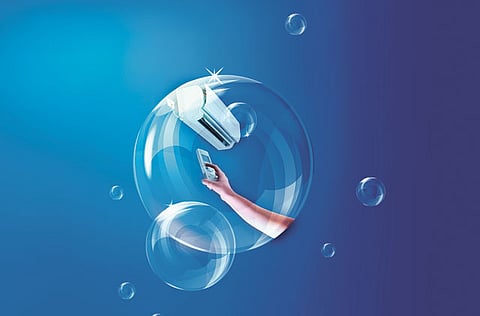Next-gen cooling
Hardware and software advances mean a new breed of highly efficient air conditioners, which use less electricity to give you better results

The ever-rising temperatures in the region have brought about a need for resourceful cooling technology. This has prompted air conditioner (AC) manufacturers to develop machines that can conserve energy while maintaining efficiency.
The Dubai Water and Electricity Authority (DEWA) says that increasing the amount of energy saved by individual consumers daily can help reduce total demand for electricity in Dubai, especially at peak times during hot summers when air conditioners across the country place huge pressure on power generating plants.
Green cooling
With this in mind certain technological trends are beginning to take shape. Samsung’s latest range of air conditioners, Crystal and Max, for instance, are designed in such a way that they can lower energy utilisation by 31 per cent. With its smart saver mode, the compressor can cool the room in a very short while.
Panasonic recently introduced the first-of-its-kind tropical inverter air conditioner range, fitted with the company’s Econavi technology, designed to specifically meet the region’s climate challenges. These air conditioners can cool 1.5 times faster than their non-inverter counterparts and save up to 30 per cent more energy. Consistent, non-interrupted cooling is also possible when outdoor temperatures soar to 55°C.
Cool, clean air
Did you know that some air conditioners can double up as air purifiers? Samsung’s smart machines use R-410A, an environmentally-friendly refrigerant, to help get rid of indoor air pollutants and also restrain the use of materials with high global warming potential. The nanoe-G feature found within Panasonic’s new range of air conditioners claim to remove 99 per cent of the bacteria, viruses and mould found within the room its cooling. Tomoyuki Yamakawa, Sales and Marketing in charge, Air Conditioners, Asia, Middle East and Africa for Panasonic, explained that with the new Econavi technology comes Sunlight Detection, a feature that can sense weather conditions, reduce cooling power and automatically set the appropriate temperature when the sun goes down. LG’s Plasmaster technology cleans and improves air quality via a powerful plasma filtration system. Its virus and allergy-safe filter is proven to deactivate viruses that pose a risk to health, including Influenza A (H1N1) by up to 99.9 per cent.
New hardware
LG Electronics has also incorporated cutting-edge technologies in its Titan series of air-conditioners to make it more energy efficient. “The machine helps save energy owning to its high efficiency motors and minimised cylinders, which make its rotary compressors 12 per cent more energy efficient than a reciprocating compressor,” explains D.Y. Kim, President of LG Electronics Gulf.
Panasonic’s new models feature a highly durable compressor and fan motor that maintains room comfort even under the hottest conditions. A tightly sealed electrical component box prevents fine sand particles from getting in to protect the high-precision inverter circuit and an original Auto-Cooling System prevents the temperature inside the box from rising due to heat generated by the circuit board.
The bigger picture
It is, however, also critical to incorporate the issue of energy loss in the design of a building, as ACs consume a large proportion of the total power supply. Green designs can reduce the need for air conditioning to a great extent. For instance, the need for cooling is significantly lowered if walls are insulated and high performance glass is used on the facade.
Judicious utilisation of natural lights also reduces the need for air conditioning as artificial lighting produces significant amount of heat in any room. Efforts are being made to discuss and implement cost-effective HVAC (Heating, Ventilation, and Air-Conditioning) systems in the country. Earlier this month, the Emirates Green Building Council conducted its second technical workshop to discuss the retrofitting of energy efficient HVAC systems. Council members exchanged views on system performance benchmarks to bring cost-effective solutions as well as the technologies available in the market and its impact on the well-being of building occupants.
The future
Besides the many options available, the future of alternative air conditioning lies with hybrid solar and solar powered energy. These methods are slowly gaining traction in the UAE as they are environmentally more sustainable than the other more conventional systems.
The CSEM-UAE Innovation Center, a Swiss and UAE Government joint venture to support sustainable industrial growth in the UAE, is now partnering with leading companies from Europe, Japan and the UAE to evaluate the suitability of various solar air conditioning units for the harsh UAE climate. Rajesh Reddy, the R&D engineer of solar air conditioning at CSEM-UAE, says that the demand for solar units is rising in the UAE despite higher initial investment than normal air conditioners.
Hybrid air conditioners that utilise solar energy as part of their power supply have already generated considerable interest among residential and commercial building owners in the UAE. Reddy points out that some hybrid solar air conditioners can guarantee savings of up to 30 and 40 per cent of electrical energy based on weather conditions. Salim Ahmed Mastan, CEO, Noor Power Dubai, a leading solution provider in the alternative energy sector in the Middle East, cites an example to show how its solar air conditioner Coolerado is more energy efficient than any other compressor-based air conditioner. “While you need three kilowatts of electrical energy to run a three tonne split unit for an hour, a solar unit can be run on just 300 watts of energy. Initial investment is high but you can reap benefits in the long run,” he says.
Sign up for the Daily Briefing
Get the latest news and updates straight to your inbox



